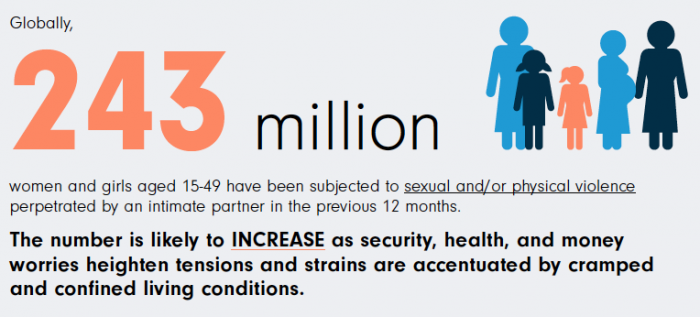Ally Voices
Our ‘Ally Voices’ is a new series of blogs that will chronicle the stories and views of WBA’s diverse and global Alliance.
Written by: Paulina Ondarza Dovali, Partnerships Associate, World Wide Generation

The Shadow Pandemic – An expansive role for Business in advancing Gender Equality
As we approach the end of the first year in the Decade of Action for the delivery of the Sustainable Development Goals as a global resolution to poverty, inequality and climate change, it sure feels much different than anticipated.
Fueled by the ambitious 2030 deadline asking us to deliver concrete actions for a sustainable future, what we have encountered instead is a year of shock – where the world has in many ways stood still as the livelihoods, freedoms and guarantees that were once considered our ‘normal’ radically changed for years to come. World economies have suffered the largest shocks in decades; many industries are now on the brink of collapse; the developed world that was thought to be a role model example has shown how fragile, unequal and inconsistent it is with the values it promotes worldwide. Paradoxically, it is by standing still, that the fragility of our economic and social systems has finally been exposed bringing a renewed sense of urgency to the priority issues we must address for any and all of the SDGs to be achieved by 2030.
In the context of repaving the ‘Future of Work’ to #BuildBackBetter, the issue of Gender Equality takes centre stage. During this pandemic, Business has in many ways been forced to acknowledge a transformation long overdue from re-defining what it means to be a responsible business through the embedding of sustainability and social value creation principles at the core of business strategies, all the way to the transformation and digitalisation of business operations to enable remote working. In this latter transformation, many gains have been made “ushering in a new era of productivity, inclusiveness and connectedness”.
Business leaders across the world are embracing this “new normal”, experiencing increased workforce productivity, efficient and inclusive communication that flattens out traditional work hierarchies while promoting collaboration and innovation. Estimates suggest that as a result, the number of global permanent remote workers will double in 2021, increasing from 16.4% to 34.4%.
However, in a separate study by IBM, the research finds that employees and executives don’t always see eye to eye on the benefits of this new normal. There appears to be an assumption the value-add of remote working to an employee’s work-life balance justifies the business’ gains in operational efficiencies, where in reality employees find no balance are tired and overworked. IBM finds that when it comes to matters of physical and emotional health support, only 46% of surveyed workers believe their organization is doing enough to help them with their well-being, vs the perception of 80% of employers who believe they are delivering appropriate support.
This gap indicates a disconnect between the Employer’s understanding of their employees’ needs and of the impact that remote work may have on their health and well-being. Applying a gender lens to this highlights the disproportionate impact that this shift has had on the female workforce, deepening pre-existing inequalities, amplified by the vulnerability in our social, political and economic systems as exposed by the pandemic. In a non-exhaustive list, the disproportionate impact on women has meant that:
- Women’s access to income is less secure – in part due to their overrepresentation in the industries hardest-hit by COVID-19 including; hospitality & retail industries, meaning female jobs are 19% more at risk than men.
- Women face an increased burden of unpaid care and domestic work as a result of school closures and reduced child care support, resulting in working mothers having to balance full-time employment with childcare and schooling responsibilities, known to amount to 3x more unpaid work than the time spent by fathers, pre-pandemic.
- Lack of basic worker protections for 58% of employed women in the informal economy such as paid leave, notice periods or severance pay, putting themselves and others at risk to provide for their families.

Image source: UN Women, “The Shadow Pandemic: Violence Against Women and Girls and COVID-19”
In this context, one of the most significant impacts on women has been coined as “The Shadow Pandemic”. Referring to the increase in reports of domestic violence caused by security, health and economic concerns arising from this the crisis and further exacerbated by the confined living conditions to contain the spread of the virus. Pre-pandemic levels showed that in the last year, 234 million women aged 15-49 have been subject to sexual or physical violence by an intimate partner. Throughout this pandemic, many countries have seen calls to domestic abuse helplines increase fivefold. In the UK, calls to helplines increased by 65% in one weekend alone and domestic abuse killings more than doubled during the first two months of the pandemic.
The increased pressure on health and basic service systems has meant that meaningful and relevant support to women and girls experiencing violence is challenged. The current living conditions further challenge women’s access to support partly due to a lack of access to phones or online services and having their perpetrators confined at home. Prior to the pandemic, 40% of domestic violence survivors did not seek help throughout their abuse, and less than 10% reported it to the police, suggesting that the expected numbers of domestic violence cases are likely to be higher than those currently reported. These would also indicate an increase in the economic impact of violence against women previously estimated at US$1.5 trillion.
So what does this mean for business?
Whilst, businesses and many employees may be experiencing the benefits of remote working, for the women suffering from domestic abuse, remote working is not only inconvenient, but it’s also terrifying. This evidence leads to question how this shift and blurring of lines between work and home must also translate into an expansion of Business responsibilities both as a ‘duty of care’ to its workforce and a commitment to the values it seeks to promote.
Some companies have been proactive in developing solutions that support their employees and wider communities to address violence against women during this crisis. For example, Vodafone adapted its Global Policy and Toolkit on domestic violence and abuse to this new reality to ensure that employees can work safely from home by offering a comprehensive range of support, specialist counselling and ten days paid safe leave. The Vodafone Foundation has also developed the Bright Sky app to give support and information to survivors of domestic violence and abuse in many of its global markets.
Other companies have developed networks and campaigns using social media to raise awareness, such as Kering who developed an awareness campaign called #YouAreNotAlone.
Five immediate actions your organisation can take to address domestic violence:
- Ensure your remote working strategy includes effective responses to the risks of heightened levels of domestic violence.
- Seek expert advice to ensure appropriate workplace responses in supporting survivors while involving and supporting women’s leadership and decision-making.
- Provide practical guidance, resources and training to equip staff with the skills and capacity to recognise and respond with support affected employees.
- Promote clear messaging from the Business’ leadership on your company’s commitment to supporting employees affected by domestic violence, with confidentially and without recrimination.
- Engage in public awareness campaigns about the risks of domestic violence & emergency services available, and encourage others to report their concerns if someone is in danger.
In the longer term, our recovery efforts from COVID-19 must place the elimination of violence against women at the top of our priorities, as it is an obstacle to achieving equality, development, peace and the fulfilment of human rights for women and girls. In the spirit of the International Day for the Elimination of Violence Against Women, celebrated annually on November 25th, I ask that organisations commit to advance Gender Equality and take this opportunity to transform their strategies, effectively allocate resources to support the Company and Employees working remotely and align to global frameworks such as the Sustainable Development Goals and the Women Empowerment Principles. Doing so will help develop appropriate policies to address all aspects of Gender Equality and identify the gaps in your data to measure progress towards your sustainability commitments.